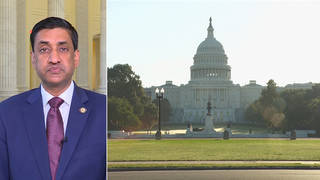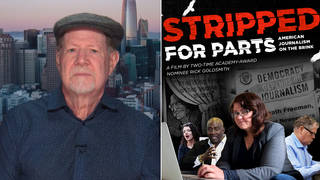
Topics
Guests
- Robert Reichprofessor of public policy at the University of California at Berkeley, and former secretary of labor in the Clinton administration. Time Magazine named him one of the 10 most effective cabinet secretaries of the last century. He has written 13 books, including Aftershock: The Next Economy and America’s Future. His latest is an e-book, Beyond Outrage: What Has Gone Wrong with Our Economy and Our Democracy, and How to Fix Them.
Former Secretary of Labor Robert Reich critiques President Obama’s handling of the economic crisis and the Clinton administration’s repeal of the Glass-Steagall Act, a key deregulatory move that ended the separation of commercial and investment banking and is widely seen as having helped lead to the financial collapse. The Clinton administration also presided over a drastic transformation of U.S. welfare laws, throwing millions off of welfare rolls. “I went outside of the White House, walked back to my office along Constitution Avenue, expecting I would see signs. … There are a lot of people who were concerned about that issue. But there was nobody on the streets. It was deafening. The silence was deafening,” Reich says of the day Clinton signed the change into law. He notes this is when he realized, “if people who are concerned about the increasing concentration of wealth and power in this country are not mobilized, are not visible, then nothing progressive is going to happen.” Reich is professor of public policy at the University of California at Berkeley. He has written 13 books, including “Aftershock: The Next Economy and America’s Future.” His latest, an e-book, is just out: “Beyond Outrage: What Has Gone Wrong with Our Economy and Our Democracy, and How to Fix Them.” [includes rush transcript]
Transcript
AMY GOODMAN: President Obama launched his campaign for re-election over the weekend with appearances in the battleground states of Virginia and Ohio. Drawing on growing discontent with income inequality and a stagnating economy, Obama criticized challenger Mitt Romney and the Republican Party for catering to the super rich.
PRESIDENT BARACK OBAMA: This time, they want even bigger tax cuts for the wealthiest Americans. This time, they want even deeper cuts to things like education and Medicare and research and technology. This time, they want to give banks and insurance companies even more power to do as they please. And now, after a long and spirited primary, Republicans in Congress have found a nominee for president who has promised to rubber-stamp this agenda if he gets the chance.
Ohio, I tell you what: we cannot give him that chance. Not now, not with so much at stake. This is not just another election. This is a make-or-break moment for the middle class, and we’ve been through too much to turn back now. We have to move forward, to the future we imagined in 2008, where everyone gets a fair shot and everyone does their fair share and everyone plays by the same rules. That’s the choice in this election. And that’s why I’m running for a second term as president of the United States.
AMY GOODMAN: President Obama, speaking Saturday in Ohio. He ended his remarks by invoking the promise of his 2008 campaign, when anger over the nation’s financial collapse rallied millions behind his pledge for “hope” and “change.” But after nearly four years and the economy showing only modest gains, Obama is facing a different electorate than the one that propelled him to victory. From embattled union workers to immigrants to Occupy activists to debt-saddled students, the concerns of the 99 percent are now a part of the national conversation like never before.
The influence of Occupy Wall Street remains even after a winter lull that saw a decline in the protests that swept the country last fall. Speaking at Hampshire College last month, former Vice President Al Gore called for an “American Spring” to “occupy democracy.”
AL GORE: Now is the time. We need an American Spring this spring. We need—we need to occupy democracy in the United States of America.
AMY GOODMAN: That was former Vice President Al Gore. Well, I’m joined now by another top Clinton administration official who has publicly backed the Occupy movement and spoken out against the corporate greed it opposes. In his new book, former Labor Secretary Robert Reich writes, quote, “I have never been as concerned as I am now about the future of [our] democracy, the corrupting effects of big money in our politics, the stridency and demagoguery of the regressive right, and the accumulation of wealth and power at the very top. We are perilously close to losing an economy and a democracy that are meant to work for everyone and to replacing them with an economy and a government that will exist mainly for a few wealthy and powerful people,” unquote.
In addition to being Secretary of Labor in the Clinton administration, Robert Reich is professor of public policy at the University of California, Berkeley. He has written 13 books, Aftershock: The Next Economy and America’s Future. His latest, an e-book, Beyond Outrage: What Has Gone Wrong with Our Economy and Our Democracy, and How to Fix [Them]. Reich opens his new book with a dedication to the Occupy Wall Street movement, writing, quote, “To the Occupiers, and all others committed to taking back our economy and our democracy.”
Secretary Reich, it’s very nice to have you with us.
ROBERT REICH: Well, it’s nice to be here, Amy. And thank you for all you do and all Democracy Now! does to get out the truth.
AMY GOODMAN: Well, here you are in the Obama administration. He has not—you, yourself, are not in the Obama administration. He has launched his campaign for re-election. How interesting that it’s under President Obama that the Occupy movement was launched. Can you comment?
ROBERT REICH: Well, I think once you ignite the possibility and ignite hope, people, particularly people who have suffered declining real wages, adjusted for inflation, for many years, who have seen the country’s political apparatus become more and more entrenched in big money, that word “hope” really does stir people to action. And if you don’t get to where you are expecting to get—and Obama certainly ran into very strong headwinds; many of us think that he compromised too much with completely intransigent Republicans—then there’s going to be, obviously, a great gap between aspiration and reality. And whenever there is a great gap between aspiration, hope and reality, you get people mobilizing and energized. And that’s a good thing.
AMY GOODMAN: Where do you think he accommodated too much, he acquiesced too much?
ROBERT REICH: Look, I wasn’t there in Washington under the Obama administration, but I do know Washington pretty well. I think that he gave in too much on the public option under the new healthcare act. I think we could have fought for and got a public option. I think he didn’t put strings, didn’t attach strings to the bailout of Wall Street. He should have said to Wall Street, “If you get this public money, you’ve got to mitigate mortgages that are underwater because of the huge explosion that you, Wall Street, engineered.” I think that he didn’t ensure that Wall Street would, essentially, hold back their lobbyists when it came to fundamental reform of Wall Street. He didn’t insist on resurrecting Glass-Steagall. And the Volcker Rule really was a Glass-Steagall-lite, and it’s like Swiss cheese: it has so many holes in it. Again and again, I think the President didn’t go as far as he could have gone and should have gone.
Now, people in the White House tell me there was no hope. I mean, the Republicans were just absolutely adamant. Well, I think that’s probably true. He came into office expecting more collaboration from the Republicans than they were going to give him. I still wish he had mobilized more people behind him. One thing I’ve learned, Amy, is that nothing good happens in Washington, even if you have good people there, unless good people outside Washington are energized and mobilized and organized and pushing to make sure good things happen in Washington. And so, you know, too many of us focus on the presidential campaign or the congressional campaigns, and then, once we, to the extent that we do, get the people in we want to get in, we give up, and—or we go home. You know, we say, “All right, we’ve done what we need to do, and we’ll wait another four years.” That’s not the way the system really works. The way the system works is we’ve got to keep enormous citizen pressure on everybody there.
AMY GOODMAN: Well, let’s talk about President Obama’s economic team as one example. I want to turn to author Ron Suskind. He wrote the book Confidence Men: Wall Street, Washington, and the Education of a President, which deals with the Obama administration’s failings in early management of the financial crisis. Speaking to Democracy Now! last year, Suskind discussed the stark contrast between Obama’s economic team after he was elected and before he was elected. Upon taking office, Obama appointed a number of officials from the Clinton administration whose policies helped cause the financial crisis, but in the months leading up to the election, Suskind says Obama relied on a different group, one that included our guest, former Labor Secretary Robert Reich.
RON SUSKIND: All the way through into the fall, the community that gathers around Obama is an ecumenical, bipartisan community—Paul Volcker; Bill Donaldson, the SEC chairman under George Bush; Robert Reich; Laura Tyson; you know, Robert Wolf, an executive from Wall Street ready to do virtually anything for the President and speak real candor. This group is important to Obama, because it is, in many people’s minds, the kind of group you want in a crisis: nothing in terms of a dog in the fight for any of them, and speaking clearly to Obama. This group, all the way to the fall, is primary and central, at which point, however, they are replaced, for the most part, washed away, certainly by the time the administration starts, by a different group, which are mostly those who are tied in some ways to Robert Rubin and the Clinton administration.
AMY GOODMAN: That was author Ron Suskind. Robert Reich?
ROBERT REICH: Well, it’s self-serving for me to say, “He’s right. You know, we should have been there.” And—
AMY GOODMAN: But what happened? I mean, here you are, working with Obama as he is running for president, but then when it comes to the crunch, when it comes to governing, not running, he turns to the same old figures that were as comfortable with the Bush administration and the Clinton administration before that.
ROBERT REICH: Well, let me give a charitable interpretation, because I obviously don’t know. The charitable interpretation is that campaigning is different from governing, and when a president actually moves to—a president-elect moves to governing, he’s going to reach out to people who he feels not only have the expertise for governing but also can be heard by the other side, have respect from the powers that be, can negotiate with the other side. And he’s probably going to turn not to people who are advocates, who have very strong—have staked out very strong positions, and who the other side may be less willing to, in any way, negotiate with.
AMY GOODMAN: But aren’t they advocates? Aren’t the people that he chose the actual advocates, from Larry Summers to Geithner, etc.?
ROBERT REICH: You know, it’s a very good question. I mean, I—and it’s awkward for me to answer, because I know—I don’t know Geithner. I’ve never worked with Geithner. Summers and Rubin, I do know. I think it’s fair to say, and I’ve been public about this, that in the Clinton administration I did part ways with Rubin. We fought about a lot of issues, and I lost most of those fights, but I won some of the fights. I have a lot of respect for him. I think his values are different from mine, not that they’re necessarily better or worse. And undoubtedly, he had—Robert Rubin has had a lot of influence, or certainly had a lot of influence at the start of the Obama administration. Now, that’s my charitable interpretation, is that these people were bridges. You’re saying that actually they may be advocates for Wall Street and for a very narrow set of interests.
It’s very hard, Amy—again, I’ve got to tell myself, “Don’t be self-serving. Don’t be self-justifying. Don’t try to puff yourself up.” It’s very hard to be completely objective about it, because having spent so many years fighting with them on the inside. And I don’t like the fact that Rubin and others gave up Glass-Steagall and convinced Clinton to give up Glass-Steagall, or that Rubin and Summers basically said to the Commodity Futures Trading Corporation—Commission, “Don’t worry about derivatives. Let’s not even try to regulate derivatives.” There was not, in my view, enough concern about inequality and the drift toward wider and wider inequality. But, you know, when you have a lot of fights on the inside of an administration, the temptation is not to air the dirty linen more than you absolutely need to to rally people to your side. That is, it would be unbecoming of somebody who is in an administration to describe in much detail the fights that went on or to criticize the other side. I don’t—I think Bob Rubin is a good man. I think that he is not—
AMY GOODMAN: I mean, I think what mattered is that Clinton—who Clinton paid attention to, I mean, why he chose, for example—and we’ll talk about this right after break—to go the route he did with welfare reform, with getting rid of Glass-Steagall. He ultimately is the decider, just as President Obama is.
ROBERT REICH: Oh, yes, absolutely. And, you know, I did not make my disputes with Bill Clinton particularly secret. I mean, I wrote a book about it. Even at the time, when I was in the administration, I was quite vociferous. In fact, I was a pain in the neck. I’m not sure he was all that unhappy that I left, although he didn’t push me out.
But the world on the inside of an administration is very different from the world outside. It’s very hard. I mean, take welfare reform, so-called welfare reform. I mean, the Republicans gave Bill Clinton, I thought, a very bad bill. I and others urged Bill Clinton not to sign that welfare bill. He did it. I remember that day. Everybody knew that he was making that decision. When he ultimately decided he was going to sign the Republican welfare bill, I was—I was, obviously, angry and depressed. And I went outside of the White House, walked back to my office along Constitution Avenue, expecting I would see signs. You know, there are welfare rights organizations. There are a lot of people who were concerned about that issue. But there was nobody on the streets. It was deafening. The silence was deafening. And it was at that moment that I kind of—it dawned on me—and I’m a slow learner—that if the left, if progressives, if people who want more social justice in this country, if people who are concerned about the increasing concentration of wealth and power in this country, are not mobilized, are not visible, then nothing progressive is going to happen, even if you’ve got some progressives there arguing.
AMY GOODMAN: This is President Clinton signing the welfare reform bill into law in 1996.
PRESIDENT BILL CLINTON: Let’s not obscure the fundamental purpose of the welfare provisions of this legislation, which are good and solid and which give us at least the chance to end the terrible, almost physical, isolation of huge numbers of poor people and their children from the rest of mainstream America. We have to do that.
AMY GOODMAN: That was President Clinton in 1996. What happened? Talk about millions of people thrown off the welfare rolls.
ROBERT REICH: Well, remember that—
AMY GOODMAN: Some call it “welfare reform”; others, “welfare deform.”
ROBERT REICH: Yeah, that so-called reform provided a maximum of five years in somebody’s life on, essentially, welfare. The assumption was that you would not have a deep recession or a depression that would go on nearly that long, and so that five years in a lifetime was about right. Well, what happened in 2007, 2008? We had a severe downturn. Who got caught in that downturn worse than anybody else? It was people at the bottom, in the bottom 20 percent, a lot of them minorities, a lot of them women. They are still caught in the downturn. Where is most of our unemployment? The welfare law, that maximum—gave them a maximum of five years, many of those people do not—are no longer eligible for anything. Their families are no longer eligible for anything. I mean, we, in signing—Bill Clinton, in signing that law, essentially condemned a substantial number of our most vulnerable people in this country to hardships that should never, in a civilized society, be imposed on anyone.
AMY GOODMAN: Bill Clinton did.
ROBERT REICH: Bill Clinton did. Now, again, the economy at that time was buoyant. We created—or at least presided over an economy, by then, that was down to 4 percent unemployment. But there was no guarantee that 4 percent unemployment would be the norm. I mean, on the inside—and then, subsequently, I said, we might have recessions, we might have 6 or 7 or 8 percent unemployment. You know, now, among the very poor, we have 20 percent or 25 percent high school dropouts, almost 30 percent unemployment. If we don’t have any safety net, it’s not only bad for them, it’s bad for the economy, because it means that we have a lot of people who have no money in their pockets at all. Only 40 percent of people who have lost their jobs now are eligible for unemployment benefits. I mean, not just welfare—I mean, we haven’t just slashed the welfare safety net, we don’t even have much of an unemployment benefit safety net left. For people who—you know, last night, I was talking with people who said, “The reason that Americans who are unemployed are not getting jobs is because their lives are too cushy. We’ve made it too easy for them. They get a lot of unemployment benefits.” You know, where—what planet are these people on? I mean, 40 percent are eligible, and the average welfare—the average unemployment benefit is only about 20 to 30 percent of previous—your previous job compensation, in any event.
AMY GOODMAN: And now a House Budget Committee has approved a plan that would cut at least $260 billion in social spending over the next decade in order to protect military spending. It’s expected to be passed by the House, not expected to be passed by the Senate. But let’s break, and we’ll come back to former Secretary of Labor Robert Reich, now professor of public policy at University of California, Berkeley. His latest book, an e-book, is called Beyond Outrage: What Has Gone Wrong with Our Economy and Our Democracy, and How to Fix [Them]. Stay with us.
[break]
AMY GOODMAN: Our guest is former Secretary of Labor Robert Reich. The Clinton administration presided over the repeal of the Glass-Steagall Act, a key deregulatory move widely seen as helping lead to the nation’s financial collapse. The repeal ended the separation of commercial and investment banking. In this clip from before the 1999 vote, Senator Byron Dorgan of South Dakota predicted how the repeal would be remembered on its 10th anniversary.
SEN. BYRON DORGAN: We are, with this piece of legislation, moving towards greater risk. We are almost certainly moving towards substantial new concentration and mergers in the financial services industry, that is almost certainly not in the interests of consumers. And we are deliberately and certainly, with this legislation, moving towards inheriting much greater risk in our financial services industries. And so, I come to the floor to say that I regret that I cannot support the legislation. I think we will, in 10 years’ time, look back and say we should not have done that, because we forgot the lessons of the past.
AMY GOODMAN: That was former Senator Byron Dorgan of North Dakota. Robert Reich, you were a part of that whole deal, even though you opposed Glass-Steagall. Talk about what it meant then, and what needs to be done about it now.
ROBERT REICH: Well, I opposed repealing Glass-Steagall.
AMY GOODMAN: Yes, opposed repealing.
ROBERT REICH: And it essentially allowed—once that Glass-Steagall was repealed, it allowed investment banks, the casino of Wall Street, to invade commercial banks and commercial deposits, and it allowed investment bankers to utilize commercial deposits for, essentially, gambling, Amy. And that, combined with these investment banks going public, becoming publicly held companies, really opened the floodgates to an era of even greater casino capitalism than we had before.
We’ve got to resurrect Glass-Steagall. I mean, it seems to me one of the problems we have with Wall Street right now is that there is still no constraint. The major Wall Street banks are bigger than they were before. They have better access to lower-cost money. That is, interest rates for them are at a preferable rate over other banks, so they have a competitive advantage that is going to enable them to get even larger. They know, and everybody else knows, they will be bailed out if they get in trouble, because they have already been bailed out. Without a resurrection of Glass-Steagall, and without legislation that caps the size of the biggest banks, that breaks up the biggest banks—something that the Dallas Federal Reserve Board, you know, the Dallas branch of the Federal Reserve Board, has advocated—we are going to see a replay of what happened in 2008, and with all the damage to everybody else, all of the ancillary damage to everybody else in the economy that that entails.












Media Options